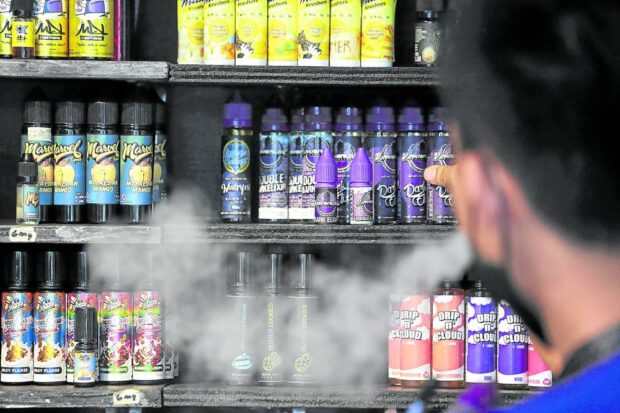PH pushed to reject vape, e-cigarettes in international meet
SMOKE SHOP A store helper arranges products at a vape shop in Quezon City in this 2022 photo. As of January, the Department of Trade and Industry has intensified its efforts against illegal vape sellers, issuing notices of violations and show cause orders to 269 stores. —GRIG C. MONTEGRANDE
MANILA, Philippines — Eleven former senior officials of the health and education departments appealed to the Philippine delegation to the ongoing high-level talks on tobacco control to stand against electronic cigarettes and vape products, citing the alarming increase in their use among Filipino youth.
“We call on the Philippine delegation to the 10th session of the Conference of the Parties of the World Health Organization Framework Convention on Tobacco Control (WHO FCTC) in Panama to affirm our commitments under the FCTC and take the lead in pushing for supporting, and promoting policies preventing the uptake of all recreational tobacco and nicotine products, including e-cigarettes, to protect present and future generations from the devastating harms of tobacco use and nicotine addiction,” said their joint statement dated Feb. 3.
It was signed by former Health Secretaries Jaime Galvez Tan, Carmencita Reodica, Manuel Dayrit, Esperanza Cabral, Paulyn Rosell Ubial and Francisco Duque III; Health Undersecretaries Alexander Padilla, Susan Mercado and Madeleine Valera, as well as by former education chief Armin Luistro and undersecretary Alberto Muyot.
“The facts and science on e-cigarettes are clear. They are ineffective for quitting tobacco use at the population level, and they are creating a new generation of nicotine addicts among Filipino youth,” they stressed.
Nicotine is a highly addictive drug that impairs human brain development.
DTI clampdown on stores
“Essentially, e-cigarettes are just as dangerous and addictive as smoking cigarettes. To say otherwise is to deceive the public, and most especially our youth, the sector most prone to such deception,” the former health and education officials pointed out.
There is no latest data on the prevalence of cigarette and e-cigarette use in the country, particularly after the enactment of Republic Act No. 11900 or the Vaporized Nicotine and Non-Nicotine Products Regulation Act in July 2022.
The law regulates the importation, sale, packaging, distribution, use and communication of vaporized and non-nicotine products and “novel tobacco products,” such as e-cigarettes and heated tobacco products.
The Department of Trade and Industry (DTI) was given the authority to certify the devices while regulating the consumables will be a joint responsibility with the Food and Drug Administration.
On Tuesday, the DTI said it had heightened its efforts against illegal vape sellers.
As of January, the DTI had issued notices of violations (NOVs) and show cause orders (SCOs) to 269 physical stores.
The government agency’s online monitoring team has inspected more than 66,000 online vape stores, finding violations in 61,000.
“The DTI focuses on retailers that fail to ensure no minor is allowed to purchase vape. The DTI has issued NOVs and SCOs to retailers for failing to verify the age of buyers and for selling vape products that are packaged, labeled, presented, or marketed with flavor descriptors that unduly appeal to minors,” the DTI said in a statement.
The DTI also said it had confiscated over 18,000 noncompliant vape products valued at P5.5 million.
Penalties for establishments and retailers selling to minors range from P10,000 to as much as P400,000, as well as jail time that could be as long as six years.
Vape users double in PH
The DOH and health advocates opposed the passage of the vaping law as it made e-cigarettes and heated tobacco products more accessible to the youth by lowering the age of access from 21 to 18 years old.
According to the 2019 Global Youth Tobacco Survey, 14 percent or 1 in every 7 Filipino youth aged 13 to 15 was already using e-cigarettes, translating to almost a million young users in the country.
Health authorities were worried about the sharp increase—from 11.7 percent to 24.5 percent—of adolescents who are now using vape products even if they have never smoked or used vape before.
READ: Vaping not a safer alternative to cigarette smoking, says health advocate
The findings of the research done by the Johns Hopkins Institute for Global Tobacco Control also revealed that vapes were flagrantly and widely sold and advertised within 100 meters in 78 percent of schools in the Philippines, despite the prohibition under RA 11900.
“We warned of the grave consequences during the congressional deliberations [on RA 11900] may have on public health. The warnings we raised on the relaxation of policies on e-cigarettes have become a tragic reality in the country,” the former officials noted.
[Editor’s Note: The story has been updated to include the name of Dr. Francisco Duque III (DOH Secretary, 2005-2009, 2017-2022), which was missed out in the statement released by HealthJustice Philippines on Feb. 3, 2024. A request to update the signatories was received by the Inquirer on Feb. 8, 2024.]
